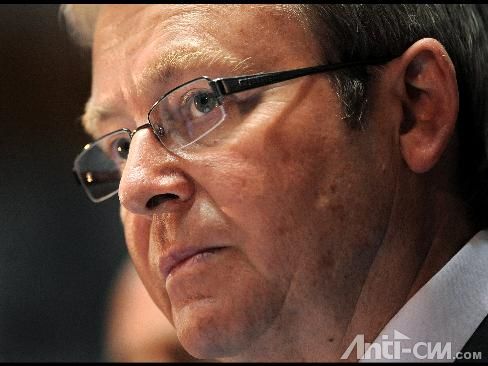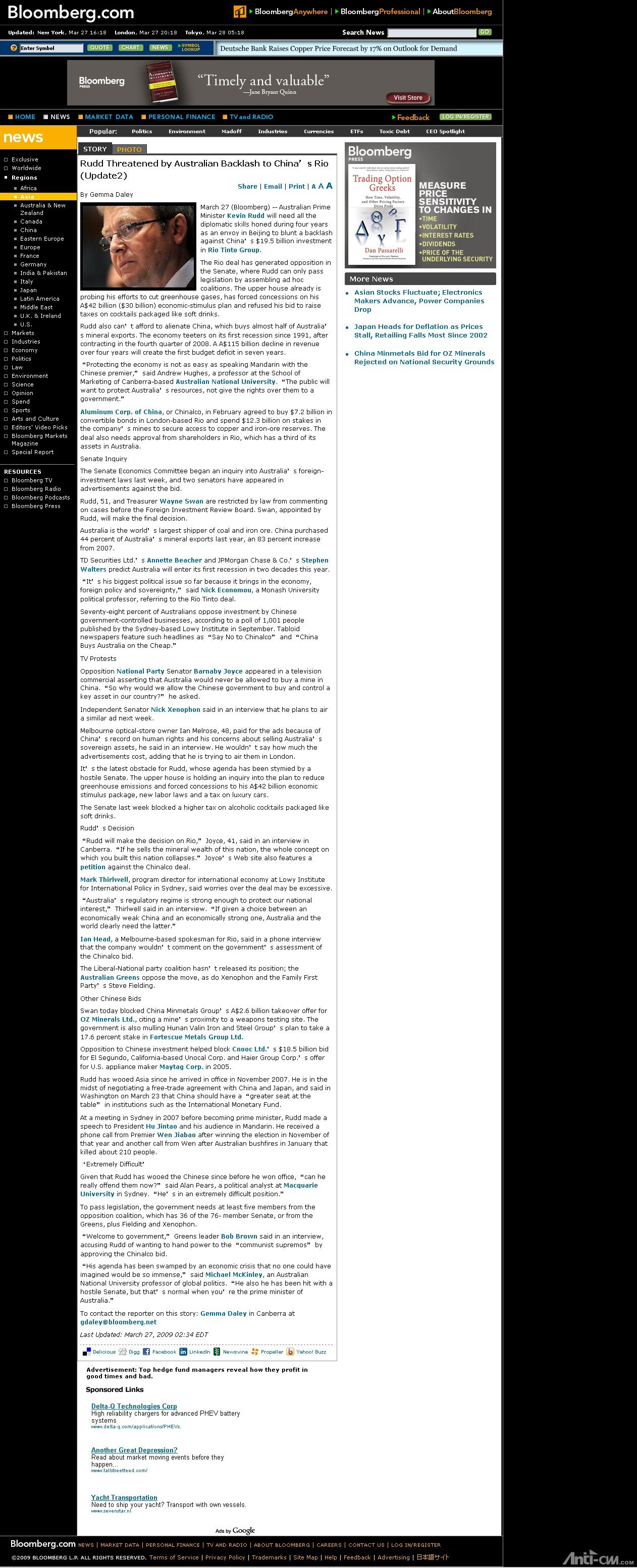|
|
本帖最后由 magicboy 于 2009-3-28 05:35 编辑
http://www.bloomberg.com/apps/news?pid=20601080&sid=apwkm5Kcg25w&refer=asia
Rudd Threatened by Australian Backlash to China’s Rio (Update2)
March 27 (Bloomberg) -- Australian Prime Minister Kevin Rudd will need all the diplomatic skills honed during four years as an envoy in Beijing to blunt a backlash against China’s $19.5 billion investment in Rio Tinto Group.
The Rio deal has generated opposition in the Senate, where Rudd can only pass legislation by assembling ad hoc coalitions. The upper house already is probing his efforts to cut greenhouse gases, has forced concessions on his A$42 billion ($30 billion) economic-stimulus plan and refused his bid to raise taxes on cocktails packaged like soft drinks.
Rudd also can’t afford to alienate China, which buys almost half of Australia’s mineral exports. The economy teeters on its first recession since 1991, after contracting in the fourth quarter of 2008. A A$115 billion decline in revenue over four years will create the first budget deficit in seven years.
“Protecting the economy is not as easy as speaking Mandarin with the Chinese premier,” said Andrew Hughes, a professor at the School of Marketing of Canberra-based Australian National University. “The public will want to protect Australia’s resources, not give the rights over them to a government.”
Aluminum Corp. of China, or Chinalco, in February agreed to buy $7.2 billion in convertible bonds in London-based Rio and spend $12.3 billion on stakes in the company’s mines to secure access to copper and iron-ore reserves. The deal also needs approval from shareholders in Rio, which has a third of its assets in Australia.
Senate Inquiry
The Senate Economics Committee began an inquiry into Australia’s foreign-investment laws last week, and two senators have appeared in advertisements against the bid.
Rudd, 51, and Treasurer Wayne Swan are restricted by law from commenting on cases before the Foreign Investment Review Board. Swan, appointed by Rudd, will make the final decision.
Australia is the world’s largest shipper of coal and iron ore. China purchased 44 percent of Australia’s mineral exports last year, an 83 percent increase from 2007.
TD Securities Ltd.’s Annette Beacher and JPMorgan Chase & Co.’s Stephen Walters predict Australia will enter its first recession in two decades this year.
“It’s his biggest political issue so far because it brings in the economy, foreign policy and sovereignty,” said Nick Economou, a Monash University political professor, referring to the Rio Tinto deal.
Seventy-eight percent of Australians oppose investment by Chinese government-controlled businesses, according to a poll of 1,001 people published by the Sydney-based Lowy Institute in September. Tabloid newspapers feature such headlines as “Say No to Chinalco” and “China Buys Australia on the Cheap.”
TV Protests
Opposition National Party Senator Barnaby Joyce appeared in a television commercial asserting that Australia would never be allowed to buy a mine in China. “So why would we allow the Chinese government to buy and control a key asset in our country?” he asked.
Independent Senator Nick Xenophon said in an interview that he plans to air a similar ad next week.
Melbourne optical-store owner Ian Melrose, 48, paid for the ads because of China’s record on human rights and his concerns about selling Australia’s sovereign assets, he said in an interview. He wouldn’t say how much the advertisements cost, adding that he is trying to air them in London.
It’s the latest obstacle for Rudd, whose agenda has been stymied by a hostile Senate. The upper house is holding an inquiry into the plan to reduce greenhouse emissions and forced concessions to his A$42 billion economic stimulus package, new labor laws and a tax on luxury cars.
The Senate last week blocked a higher tax on alcoholic cocktails packaged like soft drinks.
Rudd’s Decision
“Rudd will make the decision on Rio,” Joyce, 41, said in an interview in Canberra. “If he sells the mineral wealth of this nation, the whole concept on which you built this nation collapses.” Joyce’s Web site also features a petition against the Chinalco deal.
Mark Thirlwell, program director for international economy at Lowy Institute for International Policy in Sydney, said worries over the deal may be excessive.
“Australia’s regulatory regime is strong enough to protect our national interest,” Thirlwell said in an interview. “If given a choice between an economically weak China and an economically strong one, Australia and the world clearly need the latter.”
Ian Head, a Melbourne-based spokesman for Rio, said in a phone interview that the company wouldn’t comment on the government’s assessment of the Chinalco bid.
The Liberal-National party coalition hasn’t released its position; the Australian Greens oppose the move, as do Xenophon and the Family First Party’s Steve Fielding.
Other Chinese Bids
Swan today blocked China Minmetals Group’s A$2.6 billion takeover offer for OZ Minerals Ltd., citing a mine’s proximity to a weapons testing site. The government is also mulling Hunan Valin Iron and Steel Group’s plan to take a 17.6 percent stake in Fortescue Metals Group Ltd.
Opposition to Chinese investment helped block Cnooc Ltd.’s $18.5 billion bid for El Segundo, California-based Unocal Corp. and Haier Group Corp.’s offer for U.S. appliance maker Maytag Corp. in 2005.
Rudd has wooed Asia since he arrived in office in November 2007. He is in the midst of negotiating a free-trade agreement with China and Japan, and said in Washington on March 23 that China should have a “greater seat at the table” in institutions such as the International Monetary Fund.
At a meeting in Sydney in 2007 before becoming prime minister, Rudd made a speech to President Hu Jintao and his audience in Mandarin. He received a phone call from Premier Wen Jiabao after winning the election in November of that year and another call from Wen after Australian bushfires in January that killed about 210 people.
‘Extremely Difficult’
Given that Rudd has wooed the Chinese since before he won office, “can he really offend them now?” said Alan Pears, a political analyst at Macquarie University in Sydney. “He’s in an extremely difficult position.”
To pass legislation, the government needs at least five members from the opposition coalition, which has 36 of the 76- member Senate, or from the Greens, plus Fielding and Xenophon.
“Welcome to government,” Greens leader Bob Brown said in an interview, accusing Rudd of wanting to hand power to the “communist supremos” by approving the Chinalco bid.
“His agenda has been swamped by an economic crisis that no one could have imagined would be so immense,” said Michael McKinley, an Australian National University professor of global politics. “He also he has been hit with a hostile Senate, but that’s normal when you’re the prime minister of Australia.”


|
Australian, Backlash, Rio, Rudd, Threatened, Australian, Backlash, Rio, Rudd, Threatened, Australian, Backlash, Rio, Rudd, Threatened
|